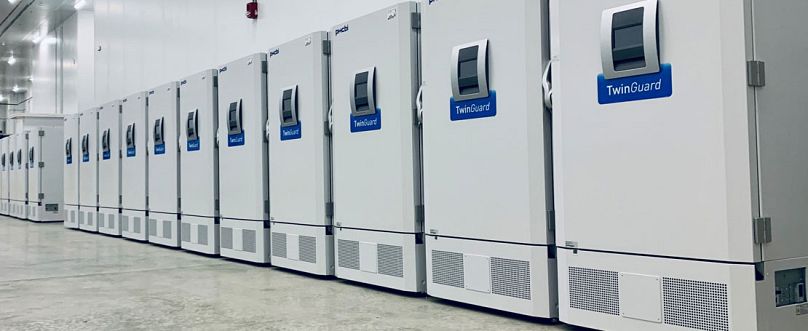Abu Dhabi’s maritime sector strategy shifts to diversification, less reliance on oil
“No one is safe, unless everyone is safe” is the thinking behind herculean efforts to immunise the world against Covid-19.
Abu Dhabi, capital of the United Arab Emirates (UAE) and a strategic hub with big growth ambitions, is at the heart of the global, vaccine supply chain.
Its Hope Consortium, a public-private led initiative, brings together Abu Dhabi’s Department of Health and various logistical partners. Together, they can handle six billion doses a year and hope to triple that capacity in time.
One of the founding members is Abu Dhabi Ports, which is investing in port infrastructure and its global trade role, as part of a long-term vision to further build its presence in the maritime sector.
“The pandemic has shown that in critical times, our governments, industries and people can successfully come together in the most unpredictable ways to save human lives,” explained Captain Mohamed Juma Al Shamisi, Chairman of the HOPE Consortium Executive Committee and Group CEO of Abu Dhabi Ports.
Blockchain supply chain
Technology is a big part of Abu Dhabi Ports’ plans for the future. With the vaccine effort, digital, blockchain-enabled technology is being leveraged to track and trace the journey of supplies being distributed via the UAE.
“Together, with our partners, we are operating one of the largest technology-led supply chain solutions in the world capable of delivering millions of COVID-19 vaccines safely, efficiently and transparently for the protection of humanity,” said Captain Mohamed Juma Al Shamisi.
Captain Maktoum Al Houqani, Chief Corporate Authority Officer & Head of the Maritime Cluster, Abu Dhabi Ports, added: “Our pioneering adoption of digitisation and automation has ensured an enhanced customer experience, created new efficiencies and helped bring to life the next generation of ports, logistics and industrial zone services.”
UAE’s largest ‘freezer farm’
As part of its maritime ambitions, Abu Dhabi Ports is growing its capabilities to store medical supplies, becoming a strategic hub.
It’s dedicated cold and ultra-cold storage facilities in the Khalifa Industrial Zone Abu Dhabi (KIZAD), spread across 19,000 square metres, as part of the Covid vaccine supply operation.
They’re now home to a so-called ‘freezer farm,’ said to be the largest of its kind in the UAE, which can hold more than 11 million vaccine does at ultra-cold temperatures of -80 Celsius.
This is on top of existing storage facilities, which can store over 120 million vials at temperatures of 2 to 8 Celsius.
“Our state-of-the-art facility forms a key component of the HOPE Consortium’s supply chain and serves as a hub for vaccine distribution across the MENA region, Africa, Asia and other parts of the world,” commented Captain Mohamed Juma Al Shamisi.
The HOPE Consortium has so far delivered over 45 million vaccines across 35 countries.
Bolstering global recovery
As well as saving lives, the World Health Organization (WHO) says vaccines will help stem the pandemic’s devastating economic impact. Preventing the loss of almost 320 billion euros to the global economy every month, according to its maths.
The UAE is keen to play a big role in the international recovery, including through its blossoming maritime sector.
It’s the first Arab member of the International Maritime Organization (IMO) Council and is currently ranked 5th in global shipping.
As well as oil ports, the UAE is home to 12 commercial trading ports. They include Khalifa, the region’s first semi-automated port, with the capacity to handle mega vessels.
The UAE says it represents 35% of total maritime investment within the region and handles 80 million tonnes of cargo a year, including nearly two thirds of freight destined for GCC (Gulf Cooperation Council) states.
“In order to stay ahead, the UAE needs to constantly evolve and innovate at home. But it must also do what it can to maintain stability and advance trade abroad,” explained His Excellency Abdulnasser Alshaali, Assistant Minister for Economic & Trade Affairs, UAE Ministry of Foreign Affairs & International Cooperation.
New trade partnerships
As part of its development vision, Abu Dhabi Ports is facilitating growing maritime trade within the Arabian Gulf and Indian Subcontinent, through a partnership which increases connectivity and optimises shipping costs.
It’s also signed up to the development of grain storage and processing plants at Khalifa Port, as part of its contribution to the UAE Food Security agenda.
This, alongside new bulk liquid storage facilities and its investment in the storage of medical supplies, including the Covid vaccines.
“The UAE welcomes increased investment in the region from all corners of the world and will continue to build up its maritime and logistics sectors to improve commercial trade routes, in line with its historic position as a global hub,” said His Excellency Abdulnasser Alshaali.
Security challenges
Further growing its maritime sector is not without its challenges. Earlier this year, a container ship ran aground in the Suez Canal, blocking one of the world’s busiest shipping routes.
There are also security risks. Maintaining flows in the Strait of Homuz and Red Sea, for instance, are crucial to the UAE and its regional neighbours.
It can all have big implications for global shipping and, as a result, cause shocks with the price of oil and costs of goods worldwide.
The UAE says it assists the international community to keep waterways open and doesn’t act alone.
A diverse future
Looking to the future, the UAE knows that diversification, less reliance on oil, is key to growing and protecting its economy. It’s a major motivation behind its ambitions to further develop the maritime sector.
“For 2021 and beyond, we are working to implement our long-term strategy to support economic diversification and industrial growth in Abu Dhabi,” said Captain Maktoum Al Houqani.
